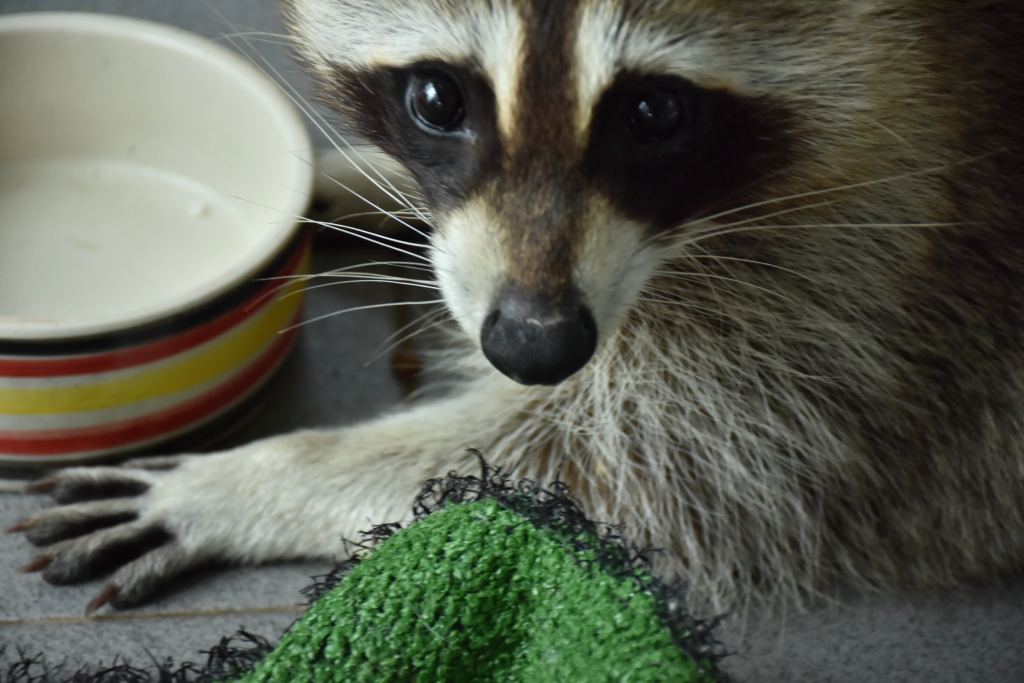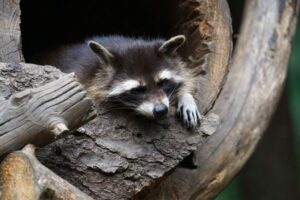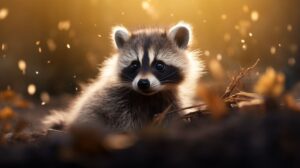Raccoons, often recognized by their distinctive black mask and bushy tail, are fascinating creatures that have adapted well to living in close proximity to humans. These nocturnal mammals are known for their intelligence, dexterity, and adaptability. Here are ten intriguing facts about raccoons that might surprise you.
Key Takeaways
- Raccoons rank high on the mammal IQ scale, closer to humans than one might think.
- They can produce over 50 different vocalizations.
- Raccoons have special paws that function similarly to human fingers.
- They can move at speeds of up to 15 miles per hour.
- Raccoons are nocturnal creatures but can be active during the day.
- They are extremely skillful and can be trained to perform tasks.
- Raccoons can survive in diverse habitats, from natural areas to bustling cities.
Raccoons Have High IQ Levels
When considering the mammal IQ scale, raccoons rank closer to humans than most would assume. They score average IQ levels just below monkeys, making them quite intelligent. Their ability to learn from past experiences and engage in critical thinking when faced with challenges is noteworthy. In fact, due to their intelligence, raccoons were once considered for lab testing but were deemed too smart and strong-willed.
Vocal Variety: Over 50 Noises
Raccoons have a diverse range of vocalizations. Studies have shown that they can produce over 51 different sounds, each conveying distinct messages. From hissing, purring, and growling when competing for food to chirping and high-pitched squeals, their vocal range is impressive.
https://www.youtube.com/watch?v=L8xe9XSQvQw
The Magic of Raccoon Paws
Raccoons possess five dexterous toes on each of their front paws, functioning similarly to human fingers. This anatomy allows them to grasp objects, scavenge for food, and even open trashcan lids. Their paws have an abundance of nerves, making them highly sensitive, especially underwater. Additionally, their feet can rotate 180 degrees, aiding them in climbing trees headfirst.
Speedy Scavengers
Always on the move in search of food, raccoons are not just walkers but fast runners. They can reach speeds of up to 15 miles per hour on solid ground and even while climbing trees. Their agility is further demonstrated by their ability to swim, helping them escape predators and catch prey.
Night Owls: Raccoons Are Nocturnal
Raccoons are primarily active at night, resting during the day. Contrary to popular belief, seeing a raccoon during daylight doesn't necessarily mean it's rabid. They might be active due to food availability or other reasons.
https://youtube.com/watch?v=zygaek_t_N0
Skillful and Trainable
Despite their wild nature, raccoons can be quite skillful. Their intelligence has enabled some people to train them to perform basic tasks, akin to those done by human toddlers, such as clapping and dancing.
Adaptable Survivors
Originally from natural tropical areas, raccoons have spread to diverse habitats, from mountains to cities, thanks to their adaptability. Their average life expectancy in the wild is two to three years, primarily due to road accidents. However, in captivity, they can live up to 20 years.
Mating Habits of Raccoons
Raccoons don't mate for life. Male raccoons often seek multiple female partners each season, while females typically mate with one partner. After mating, male raccoons play no role in raising the offspring, leaving all responsibilities to the mother.
https://youtube.com/watch?v=lbmNGChgvqg
What's in a Name?
The scientific name for raccoons is Procyon lotor, which translates to ‘before-dog washer'. Interestingly, raccoons are closer relatives to bears than dogs. The English term "raccoon" comes from the Proto-Algonquian language, meaning "one who rubs, scrubs, and scratches with its hands".
City Lovers
Raccoons have a penchant for city life. Toronto, for instance, has a high raccoon population, with numbers significantly higher than in suburban areas. Cities offer them ample scavenging opportunities, especially in trash bins.
Read more about raccoons in the city
Raccoons and Their Remarkable Adaptability
Raccoons have showcased their ability to thrive in various environments. Originally found in natural tropical areas, they've expanded their territories to include mountains, forests, and even bustling cities. Their adaptability is evident in cities like Toronto, which boasts a high raccoon population. These urban environments offer raccoons ample scavenging opportunities, especially in trash bins, making them a common sight in many neighborhoods.

The Mating Rituals of Raccoons
Unlike some animals that form lifelong bonds with their partners, raccoons have a more transient approach to relationships. Male raccoons often seek multiple female partners each season. After mating, the males play no part in rearing the offspring. The responsibility of nurturing and protecting the young falls solely on the mother.
Decoding the Raccoon's Name
The raccoon's scientific name, Procyon lotor, offers insights into its characteristics. Translated from neo-Latin, it means ‘before-dog washer'. While the name suggests a canine connection, raccoons are closer relatives to bears. The English term "raccoon" has roots in the Proto-Algonquian language and aptly describes the creature's behavior, meaning "one who rubs, scrubs, and scratches with its hands".
https://www.youtube.com/watch?v=E2HMgNss7WI
Raccoons: The Urban Explorers
Cities, with their maze of alleys and abundance of food sources, are a paradise for raccoons. Toronto, for instance, has a raccoon population that significantly outnumbers those in suburban areas. Their ability to navigate the urban jungle, from scaling buildings to raiding trash bins, showcases their intelligence and adaptability.
Discover more about urban raccoons
Frequently Asked Questions (FAQs)
Why do raccoons wash their food?
Raccoons have a habit of dipping their food in water before eating. This behavior, often mistaken as "washing", is believed to enhance the tactile experience, as their paws are highly sensitive and can perceive more details when wet.
Are raccoons dangerous to humans?
While raccoons are generally not aggressive, they can become defensive if cornered or threatened. It's essential to maintain a safe distance and avoid direct interaction.
How can I prevent raccoons from raiding my trash?
Secure your trash bins with tight-fitting lids and use bungee cords to keep them in place. Placing ammonia-soaked rags near the bins can also deter raccoons.
Learn more about raccoon-proofing your home
Do raccoons carry diseases?
Yes, raccoons can carry diseases like rabies, leptospirosis, and raccoon roundworm. It's crucial to avoid direct contact and ensure pets are vaccinated.





